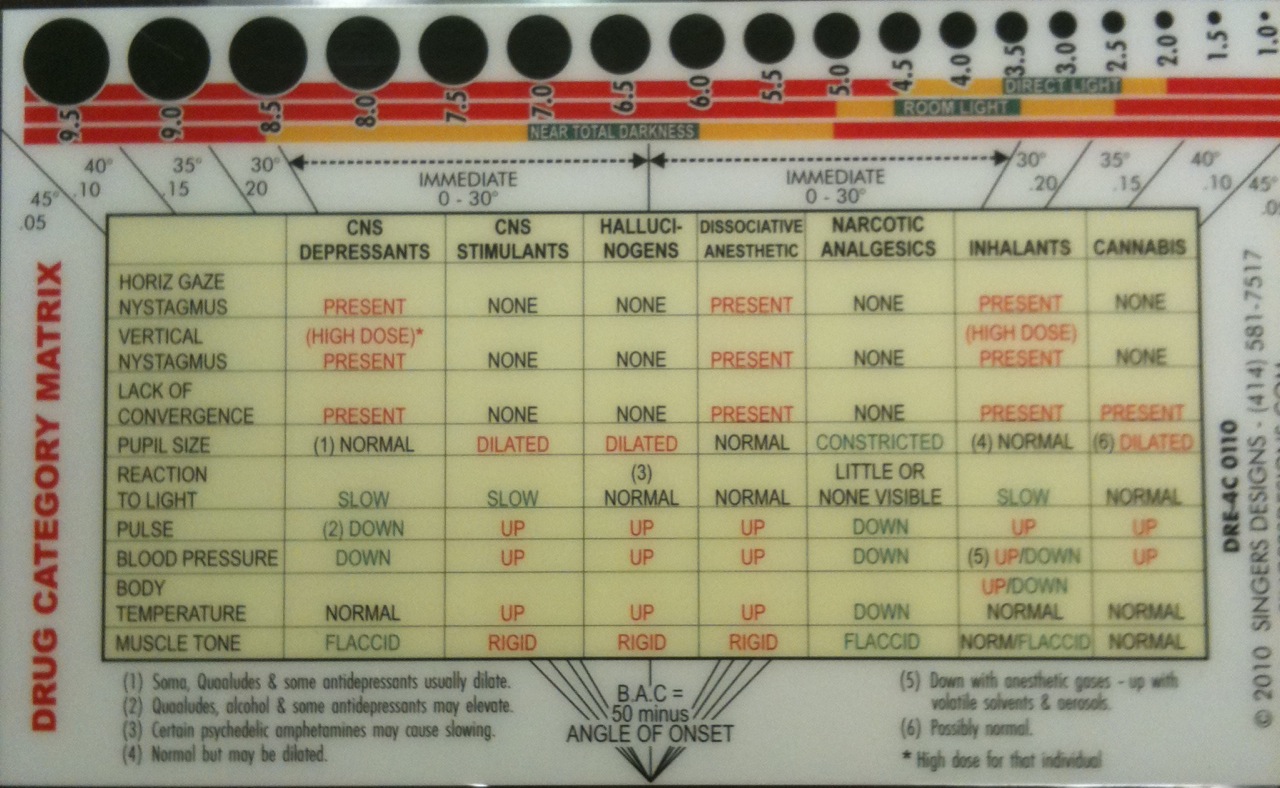 As I have blogged before DUID cases should be very difficult to prosecute due to the pharmacological differences among us. In this six part post we started to explore all of this:
As I have blogged before DUID cases should be very difficult to prosecute due to the pharmacological differences among us. In this six part post we started to explore all of this:
Part 1. Introduction
Part 2. Pharmacokinetics
Part 3. Pharmacodynamics
Part 4. Bioavailabilty
Part 5. “Free versus Bound Drug“
Part 6. Elucidating Pharmacodynamic Effect from an Analytical Chemistry Result

In a very well-litigated case where the prosecution brought in its very best national experts and the defense had funding and knowledge into the DRE program, the trial court quite clearly found the Drug Recognition Expert (DRE) program to be unscientific and unreliable. As a result the evaluation and the conclusion was inadmissible.
The case citation is: State of Maryland v. Charles David Brightful, et al, No. K-10-04-259, Circuit Court for Carroll County, MD March 5, 2012. The full opinion of the court is available here.
What makes this victory even more complete for science is that the court per Maryland state case law used the much looser Frye standard that governs admissibility of the prosecution evidence. So under the Frye standard, the prosecution should have had a much easier time to have the evidence gain admissibility.
Here is the holding of the court:
Applying Md. R. 5-702 to the proposed DRE testimony, the Court finds that a drug recognition expert is not sufficiently qualified to render an opinion, that the testimony is not relevant, and the probative value of the evidence is substantially outweighed by its prejudicial effect.
Findings of Fact:
The DRE Protocol fails to produce an accurate and reliable determination of whether a suspect is impaired by drugs and. by what specific drug he is impaired. The DRE training police officers receive does not enable DREs to accurately observe the signs and symptoms of drug impairment, therefore, police officers are not able to reach accurate and reliable conclusions regarding what drug may be causing impairment.
Six experts testified for the government. Three testified for the defense: a clinical pharmacologist, an ophthalmologist, and a psychiatrist. The defense experts, in summary, were all highly critical of different aspects of “drug recognition experts” and the protocol used by DRE’s. All three defense experts testified that the DRE protocol and matrix are not generally accepted in the fields of medicine including specifically pharmacology, neurology, ophthalmology and psychiatry.
From the opinion itself:
Although the DRE program is utilized in 45 states, the presence of the DRE program does not equate to widespread judicial acceptance by appellate courts nor acceptance in the medical community.
Mr. Tower (he is a liaison from NHTSA and government expert) further testified that in addition to the wide discretion in what weight to give the indicators on the matrix, the DRE is not even required to complete the 12-step protocol to reach an opinion as those steps are merely “preferred.” (Tr. 2/14/11 at 95-96). Mr. Tower testified that even if no drugs at are found in the subject’s blood, the DRE is “not going to change [their] opinion after you get the blood.” (Id. at 103-04) Mr. Tower stated that the reason there would be no change in the officer’s opinion is that “you are limited on what the lab can test for.” (Id. at 104) (Emphasis supplied.)
Part of the defense expert psychiatrist’s testimony:
I have got to tell you, your Honor, DRE is something that’s not foremost in the mind of those of us who take care of substance abusers, clinically or forensically. People are aware of it. But it’s- no one I know of, no physician I know of would even consider using this matrix or the – even pieces of it in determining either whether someone was impaired on drugs or even more ridiculously to tell which specific drug category. It’s ridiculous-I can’t emphasize that enough.

For both sides it was the most comprehensive hearing to date looking directly at the scientific reliability and admissibility of the DRE process.
To validly interpret the totality of the circumstances, these cases take experts–real credentialed pharmacologists with clinical experience who have dosed folks and real analytical chemists. To defend these DUID cases, defense attorneys need to hire experts. Sadly and incorrectly most of my colleagues think they can go without. They infrequently win when they do. If the accused has a knowledgeable attorney who is schooled and truly understands the science combined with real credentialed experts these cases are quite easy to defend because the science is wholly on the side of the motorist accused in terms that the government very rarely has all of the information necessary to form a valid conclusion.
The bottom line is that claiming something is valid and proving it is valid are two separate things.
 Science was well-served by this brave and honest jurist. Justice was well served by the litigating attorneys: Brian DeLeonardo and Alex Cruickshank.
Science was well-served by this brave and honest jurist. Justice was well served by the litigating attorneys: Brian DeLeonardo and Alex Cruickshank.
So far, in past hearings where it was very lopsided with the defense not presenting experts, the government could only claim that the DRE process was valid.
Other than personal belief and perhaps anecdotal experience/observation, what is there? A broken clock is infinitely precise and totally accurate twice a day. That coincidence of observation at that exact moment when it is objectively correct doesn’t make that clock as a measuring device valid, does it?
The source of the empirical data that was used in the case to invalidate the DRE tool came exclusively from the studies NHTSA funded or indirectly funded. So it is their own research that objectively invalidates the tool. It was not defense friendly research that was cited in the hearings.
In short, the crucial question was: “Where is the scientific validation of this method?” or “Is the DRE protocol proven to be valid for its intended purpose which is to opine impairment due to source?”
Not only doesn’t the validation studies exist, but the research funded from ostensibly pro-prosecution quarters falsifies the hypothesis that it could be a useful tool.
I am quite sure that there are a lot of police officers who use the DRE protocol out there who honestly believe that it works and is valid. That’s quite fine. It is still the United States of America, they are personally free to believe whatever they like. I’m all for personal opinions. A personal opinion doesn’t have to be grounded in statistics or validation studies. It is your own.
However, what isn’t just or right is to espouse in court an opinion (expert or not) that a tool is valid when it hasn’t been proven as such, and much worse when the evidence proves that the method has no validity. Anyone’s (not the true believers) BELIEF in the usefulness and validity of a tool and/or someone’s anecdotal experience is clearly not reliable scientific proof of anything.
In essence, the basic question can be stated thusly: “Is it legitimate to suppose that an evaluation of a total stranger at one time and one time only without knowing any relevant pharmacological or physical history of the evaluee by a very minimally trained, non credentialed person, who has never done clinical rounds, dosed anyone and has no clinical experience, could be valid?”
A conviction based upon DRE even if perfectly executed is simply a sin against true science and a sin against justice.



Eric says:
Very interesting and thought provoking. In South Dakota these are being tried in court as cut and dry cases. If DRE states a person is under the influence they must be even if labs are negative and other factors like medical conditions and illnesses could be a factor.
Derek says:
Thank you, will share. It’s very important to have access to this type of information, to protect lawful citizens against unwarranted propaganda-based, prohibitionist-induced harassment.